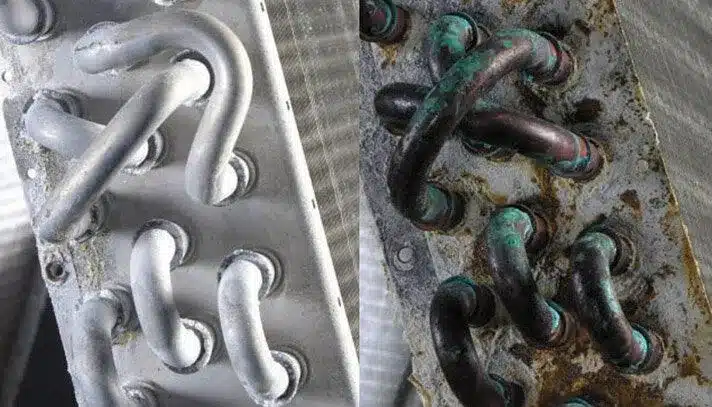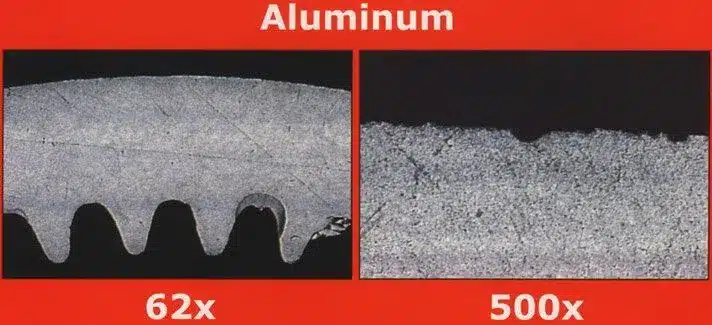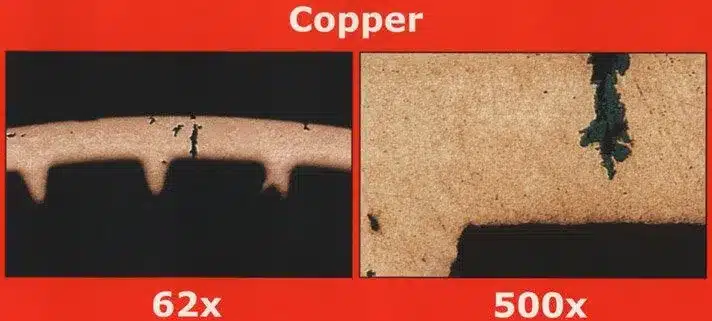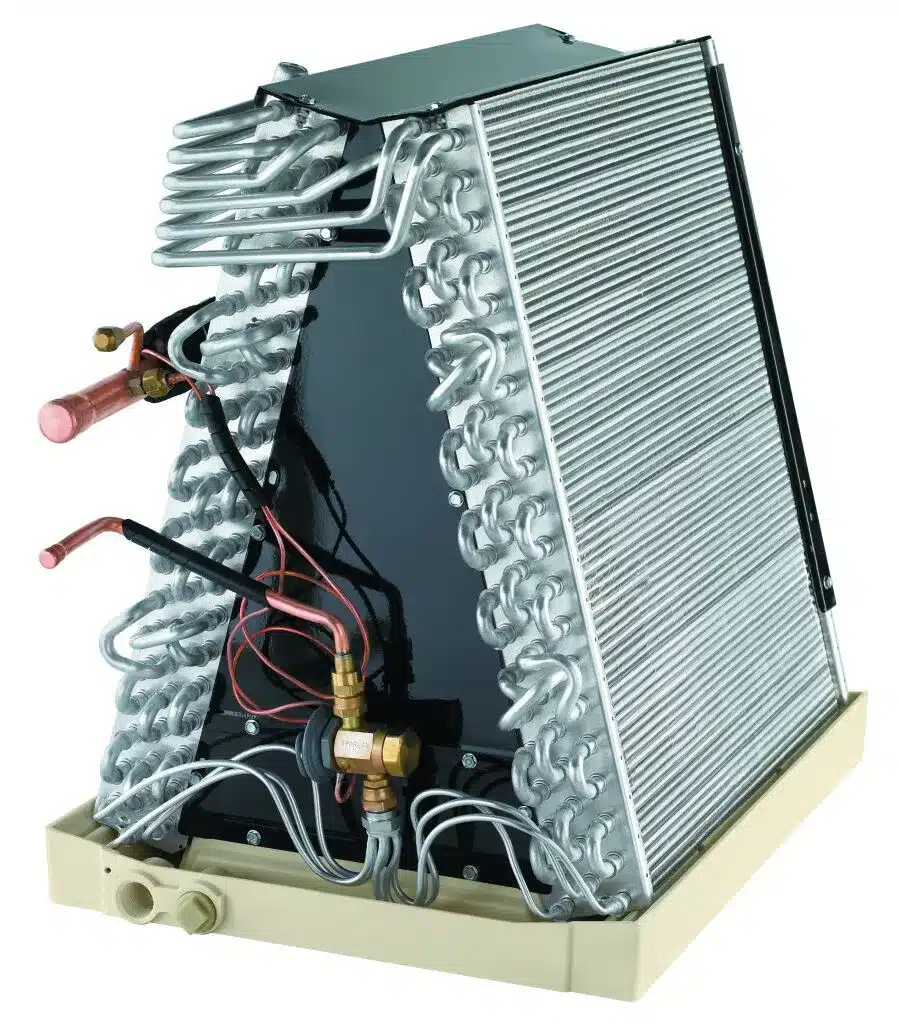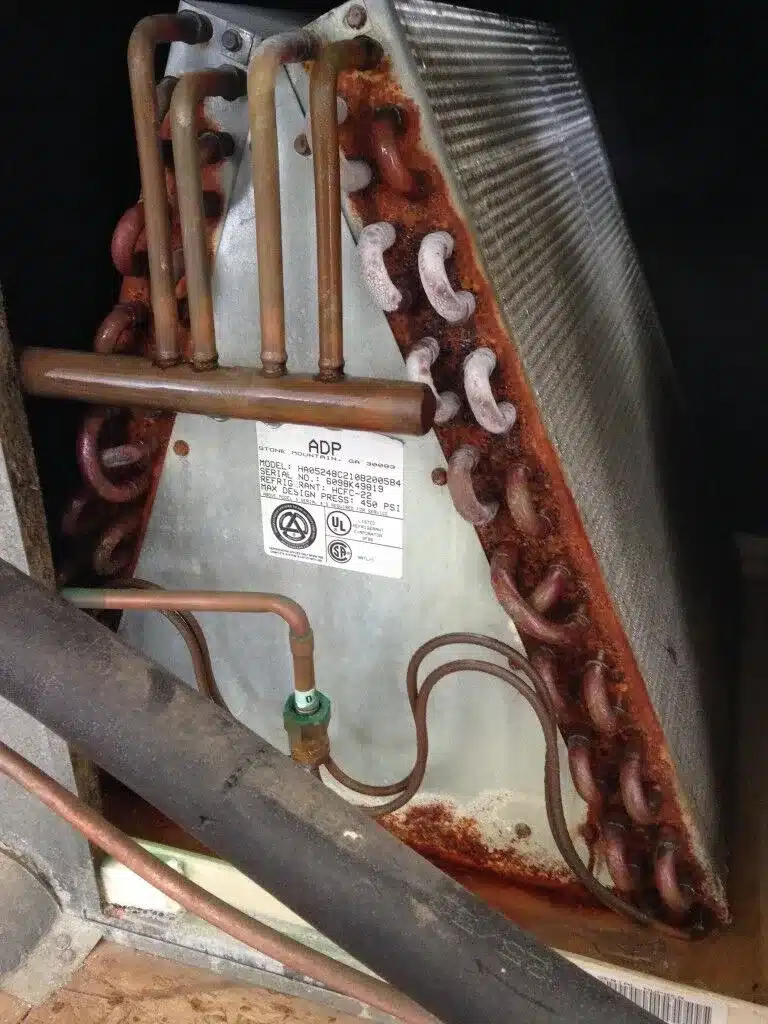How does a freon leak occur?
When a freon leak happens, where does it go?
Is a freon leak safe for the environment?
Can a freon leak be repaired?
If your home is air conditioned — and we assume it is — all of the above questions (and more) will probably arise at some point in the course of your home ownership. In our years providing heating and air conditioning service in the Boise area, we have encountered a common misconception among homeowners: that AC units leak refrigerant often, and refrigerant needs to be “topped off” from year to year. Many homeowners believe that a refrigerant leak is what is causing their system to not turn on during the hot summer months.
Read on as we debunk this myth and explain exactly what happens when an AC unit is leaking refrigerant — commonly known as “freon,” although that particular form of refrigerant is being phased out as of 2020. We will also discuss why these leaks tend to occur, and what can be done about them.
The Truth About Refrigerant Leaks
Like the air in a car tire, when AC refrigerant is low, it needs to be filled up. However, if the hole isn’t addressed, then the air will continue to leak out and cause other problems with the vehicle. The same is true regarding a refrigerant leak. Once a refrigerant leak occurs, a service technician can add more to correct the charge, but until the cause of the leak is diagnosed and resolved, the leak will continue.
In many instances, refrigerant leaks will gradually get worse as time goes on. Leaks often start as “pinhole leaks.” The industry calls these “champagne leaks,” because the refrigerant leak will often show up as tiny bubbles. A refrigerant leak typically appears in the evaporator coil. The refrigerant is mostly a superheated gas while in the evaporator coil and can therefore leak from smaller holes. Refrigerant is part gas and part liquid, depending on where the chemical is in the process and the system. When refrigerant leaks as a liquid, this often occurs outside. This is a more uncommon place for a leak to show up — and will often cost more to repair when it does.
Refrigerant leaks are unsafe for the environment because they can contribute to the depletion of the ozone layer. More important than that, though, is the possibility for refrigerant to enter the airflow inside the interior of the home. This chemical can give off a foul-smelling odor, which some homeowners might be able to detect when their HVAC system kicks on.
That said, the common idea that refrigerant leaks over time is a myth and is simply not true. The system does not consume the refrigerant over some time. Nor does it get absorbed into the copper tubing. The only place for the refrigerant to go is out — through a leak in the system.
One of our past blog posts explains WHY some service companies would tell you your refrigerant is bad.
So, how does a freon leak happen?
There are several different potential causes for refrigerant leaks. Here are some of the most common:
- Poor solder joints and connections. Air conditioning technicians use a variety of installation methods, and most methods do not rule out a leak from the day the equipment was installed. We test every sealed system after every joint is soldered with nitrogen. With more than 300 PSI in the system, any leak will quickly show up and can be fixed before the system even runs. Nitrogen is an ideal chemical to use because it has a lower molecular weight than the chemical compounds R22 or R410. Helium has the lowest molecular weight but can be very expensive to obtain just to vent out on every installation.
- Major damage to any component of the air conditioner system. Tell your lawn guys to put on white gloves around your air conditioner! Often, a lawnmower banging into the air conditioner, or a weed whacker hitting the copper tubing, can cause a refrigerant leak to develop.
- Poor manufacturing. More and more manufacturers are looking to get their products sold in a down economy. Many are cutting corners and shipping units that develop refrigerant leaks within the first years of service! Our AC replacement technicians often find that systems develop leaks within the first 5-10 years of service life here in the Treasure Valley. Additionally, high-efficiency air conditioning systems are much larger than the older units and are being made with thinner copper tubing to help reduce the size.
- Formaldehyde. This common chemical present in many homes will interact with the copper in such a way that will begin to deteriorate and corrode on a microscopic level. Formicary corrosion happens over some time and is often unnoticeable until something like a 6-year-old air conditioner needs to be recharged. Newer homes are often notorious for developing refrigerant leaks quicker than older and more established homes because of the presence of more chemicals in the building products. If you have researched indoor air quality, you’ll know that formaldehyde is a major pollutant in our homes. An infamous case of severe formaldehyde in the living space was the FEMA trailer provided to Katrina victims. While less severe than a FEMA trailer, most homes have a measurable amount of formaldehyde in the indoor air, and this will always cause formicary corrosion and refrigerant leaks.
But… What about a lesser-known cause?
This corrosion will advance at quicker stages when there is more moisture present on the evaporator coils. Moisture develops from the air traveling across the coil and being condensed — just like rain clouds in the atmosphere. Undersized ductwork or dirt filters can cause a refrigerant leak to develop at quicker rates.
How can freon leaks be resolved?
The long-term solution is to insist that evaporator coils made from all aluminum be installed in your home. Trane began manufacturing all-aluminum coils in 2005 and has had great success with this material. Through extensive testing and engineering, Trane has found that aluminum is resistant to formicary corrosion. They carry exclusive patents on their all-aluminum evaporator coils, which are a wise choice when needing to install a new coil.
We have been testing repair methods that allow a refrigerant leak to be temporarily taken care of but not permanently resolved. We have not found enough success in our early testing to offer this as a recommended AC repair solution for our customers. In many cases, the most permanent repair solution is to replace the entire evaporator coil instead of trying to weld the pinholes throughout the system. Welding a small leak can cost several hundreds of dollars, and most of the time, more leaks will show up later; costing more money in the long run.
Trane coils are the best long-term solution if you want to avoid any refrigerant leaks in the future. We think you can all imagine better ways to spend our hard-earned cash than dumping it into refrigerant and evaporator coils!
What to do if your air conditioner is leaking refrigerant
Our air conditioning service technicians will locate the location of the leak, upon your approval, and will then provide options to repair it. If the leak can be repaired as a cheaper solution, we will provide you with the estimated cost. If more work is needed, we will let you know all costs upfront before proceeding with the work. Our goal is to fix something once and for all. We always look for the root cause and seek to address that before repairing parts.
Our service technicians consider many different factors when assessing a refrigerant leak. We’ve listed the key ones in this infographic.
If you think your air conditioning system is low on refrigerant or is leaking, look at the repair history of the unit. Often, your air conditioner will have oil stains around the service ports outside if it is leaking refrigerant. If the leak is in a tough spot, it can sometimes cost thousands of dollars to have the issue resolved. That being said, we guarantee to provide you with repair options that fit within your budget.
How can you tell you have a refrigerant leak?
Take immediate note of any changes in operation from season to season. Since you live in the home, you are the best judge of how well your system is working.
Also, if you notice ice buildup around the copper tubing outside, this can often mean that your air conditioner has lost refrigerant during the season and should get looked at immediately by one of our Boise AC service technicians. The best defense against leaks is prevention, and our annual maintenance plans can keep you cool during the hottest months and avoid costly repairs from unexpected AC failures down the road.

